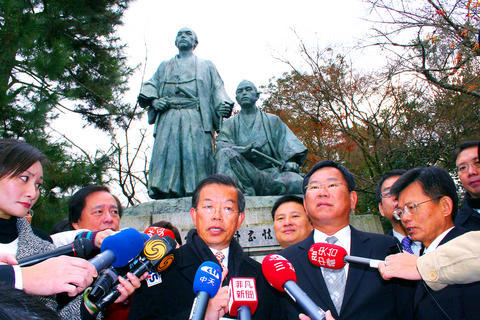Democratic Progressive Party presidential candidate Frank Hsieh (謝長廷) said in a speech in Tokyo yesterday that the presidential election next year would be an expression of Taiwanese will -- a choice between recognizing Taiwan and recognizing China.
As well as emphasizing that Taiwan is not ruled by China or the Chinese Nationalist Party (KMT), Hsieh warned that if Taiwan's status was not safeguarded, then Japan would be threatened next.
Hsieh said that Taiwan's election is akin to democratic civil war. However, despite the appearance of chaos, Hsieh promised to reinstate order if elected. He warned that victory for the KMT would be a decline from chaos to danger.

PHOTO: CNA
If elected, Hsieh promised to hold innovation, tolerance and diversity as his principle values.
Although Taiwanese previously believed they needed China, 70 percent now identify themselves as being Taiwanese and the nation should have confidence in its democracy and liberty, Hsieh said.
Although having international allies was important, he said, the mutual recognition of states, and the identification of the people with their land was even more so -- an area in which Hsieh believes Taiwan has progressed in recent years.
One of the qualifications for the presidency was the ability to convey the changes in the nation to the international community, Hsieh said. He criticized KMT presidential candidate Ma Ying-jeou (馬英九) for his lack of critical response toward China's military threat, as the oppression causes the nation to be perceived as an unstable element in Asian politics.
Hsieh said that if Taiwan gained UN membership, China would no longer be able to insist on its status as a renegade province.
Hsieh further panned Ma for his non-unification, non-independence and non-violence speech during his visit to Japan, as Taiwan had never been militarily aggressive and is already a sovereign state, he said.
Hsieh said that Ma's policies on these issues made him unfit to be the next president of Taiwan.

‘DENIAL DEFENSE’: The US would increase its military presence with uncrewed ships, and submarines, while boosting defense in the Indo-Pacific, a Pete Hegseth memo said The US is reorienting its military strategy to focus primarily on deterring a potential Chinese invasion of Taiwan, a memo signed by US Secretary of Defense Pete Hegseth showed. The memo also called on Taiwan to increase its defense spending. The document, known as the “Interim National Defense Strategic Guidance,” was distributed this month and detailed the national defense plans of US President Donald Trump’s administration, an article in the Washington Post said on Saturday. It outlines how the US can prepare for a potential war with China and defend itself from threats in the “near abroad,” including Greenland and the Panama

A wild live dugong was found in Taiwan for the first time in 88 years, after it was accidentally caught by a fisher’s net on Tuesday in Yilan County’s Fenniaolin (粉鳥林). This is the first sighting of the species in Taiwan since 1937, having already been considered “extinct” in the country and considered as “vulnerable” by the International Union for Conservation of Nature. A fisher surnamed Chen (陳) went to Fenniaolin to collect the fish in his netting, but instead caught a 3m long, 500kg dugong. The fisher released the animal back into the wild, not realizing it was an endangered species at

The High Prosecutors’ Office yesterday withdrew an appeal against the acquittal of a former bank manager 22 years after his death, marking Taiwan’s first instance of prosecutors rendering posthumous justice to a wrongfully convicted defendant. Chu Ching-en (諸慶恩) — formerly a manager at the Taipei branch of BNP Paribas — was in 1999 accused by Weng Mao-chung (翁茂鍾), then-president of Chia Her Industrial Co, of forging a request for a fixed deposit of US$10 million by I-Hwa Industrial Co, a subsidiary of Chia Her, which was used as collateral. Chu was ruled not guilty in the first trial, but was found guilty

DEADLOCK: As the commission is unable to forum a quorum to review license renewal applications, the channel operators are not at fault and can air past their license date The National Communications Commission (NCC) yesterday said that the Public Television Service (PTS) and 36 other television and radio broadcasters could continue airing, despite the commission’s inability to meet a quorum to review their license renewal applications. The licenses of PTS and the other channels are set to expire between this month and June. The National Communications Commission Organization Act (國家通訊傳播委員會組織法) stipulates that the commission must meet the mandated quorum of four to hold a valid meeting. The seven-member commission currently has only three commissioners. “We have informed the channel operators of the progress we have made in reviewing their license renewal applications, and